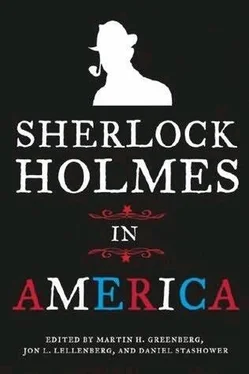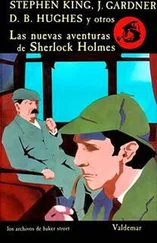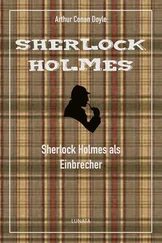“But how can you be sure it was the same person, Wiggins, after the, er, change?” I asked.
“Lord love you, Doctor!” the boy chortled. “The little girl wot seen the ‘old lady’ go in, tried to touch ’er for summat, you see, and noticed she was shy a fingernail on ’er right hand wot she swotted ’er with-and didn’t the very same detail ’ppear on the gent who come out after, and swotted ’er too?”
“This is very good work, young Wiggins,” pronounced Holmes, “on the young lady’s part as well as your own! I’ve always said the Science of Observation-”
“Begging your pardon, sir,” interrupted Wiggins, tugging on Holmes’s sleeve, “but I’ve already read ’er that lecture, an’ tipped ’er a tupenny piece as well for the nark job, which you’ll see itemized in my expense list-so ’adn’t we be going?”
The three of us were soon at the actual address, which proved to be a lodging house of a low sort. I was curious how Holmes would handle the situation, but he simply strode up to the desk next to the entrance and asked the clerk: “Is Mr. Tom Dennis in?”
“Sorry, sir,” drawled the sallow youth under the grimy fanlight, “he just checked out this evening.”
Holmes’s disappointment was no greater than my astonishment at his correct guess of the name under which our quarry would be registered, and I said as much as we left.
“Oh, that was a trifle,” he shrugged. “It’s an elementary rule to never multiply names unnecessarily-the rogue wasn’t likely to be bothered to make up a string of ’em without any need. But what now?”
Holmes looked down to find Wiggins tugging on the pocket of his frock coat.
“’Scuse me, Sir,” he said, “but I natural left Simpson as a tail, an’ he’ll reliable report back to Baker Street.”
Which indeed he did, but very late that night, with the news, alas, that Dennis had sailed for New York on the SS Nephite .
“Well, then, Holmes,” I tried to reassure him, “all you need do is get Lestrade to cable the police in New York, and the man is shackled.”
Holmes sunk deeper in his chair. “Ye-ess,” he murmured, “except… I’ve been thinking… ”
Something about my friend’s tone worried me. “Surely, Holmes, there’s nothing more for you to concern yourself with over this matter? You said yourself, only days ago, that this case was one of ‘intrinsic simplicity’! And I quote you-I took notes.”
Holmes grimaced. “My dear Watson, I shall watch myself more carefully if you are going to be quoting me back to myself like that. What bothers me is that I allowed myself to swallow so much of Jefferson Hope’s unsupported confession, and then let slip away the accomplice whose testimony he tried to withhold from me. There’s a piece missing, and I want it.”
“Undoubtedly, the New York police will nab him and send him back,” I predicted.
Events proved me wrong. In the upshot, Dennis was too slippery for the constabulary of that metropolis. But Holmes’s reaction to this was curious: rather than increasing his frustration, as I had feared, it seemed to fire him with a nervous excitement.
Then we had what I suppose must be accounted a bit of luck-although when I was later careening around the precipitous crags of Utah, and dodging bullets, I was not sure whether that luck was bad or good.
Holmes had cabled a colleague in America who had already helped immeasurably with this case: Police Superintendent Schmitt of Cleveland, Ohio, who confirmed that Tom Dennis was indeed the name by which our quarry had been known for some years, and also that he had been sighted in the proximity of Jefferson Hope while the latter was in that jurisdiction. And by the merest fluke, it happened that one of the Superintendent’s sources had informed him that Dennis had recently slipped through Cleveland again-likely on his way back to Salt Lake City. Supt. Schmitt wondered if this tip would be of any use to Holmes in his enquiries.
He would not have wondered long had he been sitting in my chair in Baker Street when Holmes read Schmitt’s cable, for Holmes burst up off his sofa like an exploding shell from a mortar.
“Watson,” he asked, suddenly as calm again as if proposing a stroll across St. James’s Park, “would you care to accompany me to the Country of the Saints?”
I rose to my feet, dumfounded. “Are you serious?”
“It would make for a change, don’t you think?” he chuckled. “A change in perspective does wonders when you’re having trouble with a case. We could grill that confounded Dennis once and for all; and then there’s nothing like going over the ground of a case for yourself, I’ve always said. I have that nagging feeling that Jefferson Hope was not quite as forthcoming with us as he might have been.”
“But my dear Holmes-I can certainly not afford it, even if you are able to.”
“Oh, tut!” he said, waving his hand. “A wealthy old lady here in London who is a member of the Latter-Day Saints-we have them here, too, you know-wishes to retain my services. Mrs. Ponsonby-Mallalieu was dreadfully offended by that stupid piece of puffery Lestrade had inserted in the papers after Jefferson Hope died in prison-the one about ‘romantic feuds and Mormonism’ being behind the murders, even though there was no trial nor even anyone charged. So the good lady has offered me a generous retainer, plus expenses, to solve the case once and for all.”
“But even with your gifts, my dear fellow,” I expostulated, “with Hope dead that will take a miracle.”
“Well, she believes in them,” said Holmes. “Miracles, that is; and she doesn’t mind paying for me to go to Utah, and I think she’ll allow me a traveling companion. Even miracle workers need their coadjutors.”
Holmes and I had crossed the ocean on the SS Liahona and then went west by train, eventually changing at Ogden, Utah, from the noble Union Pacific to the Utah Central, a Mormon-owned spur that took us right into Salt Lake City, arriving on July 1.
Brigham Young’s “New Jerusalem” had been laid out by the Prophet himself a third of a century before, and although the city’s population could hardly compare with London’s millions, there were tens of thousands thronging its streets, readily apparent as our train came into the station.
“The Mormons chose their honeybee emblem aptly, Holmes,” I said, gesturing through the travel-stained window of our car. “How do you expect to find Dennis amongst this multitude?”
“Well, well!” my companion chuckled. “We can but try! I fancy that Superintendant Schmitt’s friend, Marshal Ames, may have a bone to throw us.”
When our bags had been unloaded, we did not have to look for porters or cabmen, as our client had arranged for us to be met by her man of business in Salt Lake City, who turned out to be English, Mr. Edgar Smith.
“No need for surprise, gentlemen,” he assured us. “You’ll soon find that a fair percentage of our citizens are from the old country-why, the president himself is an Englishman!”
“What! Mr. Garfield?” I asked.
“No, no!” the man of business replied, in a hurt tone. “ Our president, the Prophet-John Taylor: the president of our Church!”
Holmes gave me a rather sharp poke in the ribs, and we rode the rest of the way to our lodging demurely in Smith’s carriage, our proud guide pointing out to us along the way the remarkable sights of Zion, like Brigham Young’s “beehive” house, and the many-spired temple, still a-building after thirty years.
On the morrow, we asked our host for directions to the United States Marshal’s office, since we were anxious to make contact with Supt. Schmitt’s colleague while Dennis’s trail was yet warm. When he learned that it was Deputy Marshal Ames whom we sought, Smith tried to warn us away from a person of ,he claimed ,questionable character. Finding us adamant, he sighed.
Читать дальше












